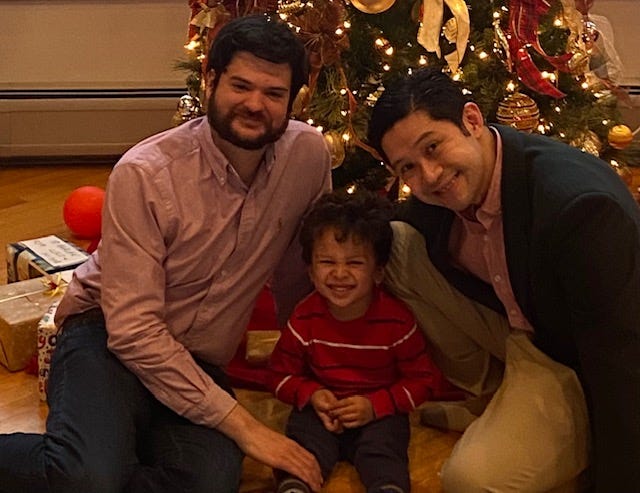Welcome to Original Jurisdiction, a new publication by me, David Lat. You can learn more about Original Jurisdiction by reading its About page, you can reach me by email at davidlat@substack.com, and you can register to receive updates on this signup page.
Merry Christmas (if applicable). I hope you are enjoying today’s holiday, as much as possible given the times in which we live, and not spending time checking email or surfing the web. But if you are online right now, here is this week’s roundup.
Lawyer of the Week: Stacey Abrams.
Not surprisingly, given the Christmas holiday, it wasn’t that exciting a week. And it also happens to be the last full week of the year. So I’m going to turn “lawyer of the week” honors into “lawyer of the year” honors — and give them to my law school classmate and friend, Stacey Abrams.
Whether or not you share her political views, you can’t dispute the fact that Abrams, a Yale Law graduate and former minority leader of the Georgia House of Representatives, was incredibly consequential in 2020. After her narrow loss in the 2018 Georgia gubernatorial race, Abrams focused on advancing voting rights in her state, using a combination of litigation, legislative efforts, and advocacy.
Through her organization, Fair Fight Action, Abrams and her team helped add an estimated 800,000 voters to the rolls — voters who surely played a critical role in Joe Biden narrowly carrying Georgia, on his way to winning the 2020 presidential election. And if the Democrats win one or both the Georgia runoff races, Abrams will surely deserve much of the credit for that as well. If you agree with my analysis, go ahead and vote for Abrams as Above the Law’s 2020 Lawyer of the Year.
(In case you’re interested, here are two other “lawyer of the year” roundups: Vivia Chen’s picks for most atrocious attorney of the year, and the American Lawyer’s four finalists for 2020 Attorney of the Year.)
Runner-up for Lawyer of the Week: L. Lin Wood Jr., who filed a (meritless, pro se) lawsuit challenging Georgia’s election process “under plenty of perjury.” But Wood won Lawyer of the Week honors just two weeks ago for another terrible typo, and I felt it was too early for a second win.
Judges of the Week: Judge James Ho and Judge Jacques L. Wiener Jr.
As his annual Christmas card goes, Ho Ho Ho! Judge James C. Ho (5th Cir.) takes Judge of the Week honors for a saucy special concurrence (to his own majority opinion) in Hewitt v. Helix Energy Solutions Group, Inc. Here’s how it opens:
(Note the shout-out to Judge Kevin Newsom, whose dust-up with Judge Robin Rosenbaum made them Judges of the Week earlier this month.)
Judge Ho’s antagonist in this case was Judge Jacques L. Wiener Jr., whose dissent closes with a famous quotation from Macbeth (as alluded to by Judge Ho):
Finally, with utmost respect for my friend and colleague who authored the special concurrence, my only response is to quote Macbeth: “full of sound and fury, signifying nothing.”39
For the foregoing reasons, I respectfully dissent.
Ouch. Although as Judge Wiener explains in footnote 39, “the harshness of the full quotation is unwarranted, and, thus, I only quote what is appropriate.”
Fair enough. To call his colleague “an idiot” would have been a bit much.
But here’s the funniest thing about this whole exchange. What provoked it? A case about some hot-button issue like abortion, the death penalty, or LGBT rights?
Actually, no. The source of all this ire: regulations arising under the Fair Labor Standards Act, aka FLSA — not the sexiest statute in the U.S. Code. What will we see next? Judges coming to blows over ERISA? CERCLA? PWSA?
Runner-up: Shirley Abrahamson, who passed away last Saturday, two days after turning 87. Abrahamson was the first woman to serve as a justice, and then as chief justice, of the Wisconsin Supreme Court. May her memory be a blessing.
Ruling of the Week: blocking the “most favored nation” rule on drug pricing.
The Week magazine has a section in each edition called “boring but important” — which is how I’d describe my latest pick for Ruling of the Week.
On Wednesday, Judge Catherine Blake (D. Md.) issued a nationwide injunction blocking the imminent implementation of a Trump Administration rule aimed at lowering drug prices, which was scheduled to take effect on January 1. High drug prices have been a hot-button political issue for years now, affecting millions of Americans, and the Trump Administration claimed that its “most favored nation” rule could end up saving taxpayers and patients $85 billion over seven years.
The rule’s undoing? What Judge Blake found to be the administration’s failure to follow required procedures for notice and comment — not the first time this administration has been stymied by administrative law. Congratulations to John Elwood and Arnold & Porter, counsel to the Pharmaceutical Research and Manufacturers of America (PhRMA), on the win.
Runner-up: congrats to Robert Giuffra and his team at Sullivan & Cromwell, who prevailed in arguing before the Texas Court of Appeals that the state lacks jurisdiction over Volkswagen, leading to dismissal of the state’s 2016 “dieselgate” lawsuit against the German automaker. To some folks, jurisdiction might also fall into the category of “boring but important” (although I don’t find it boring; I’m the guy who wrote a legal thriller where jurisdiction is a key plot point).
Litigation of the Week: the federal government suing Walmart for allegedly fueling the opioid crisis.
On Tuesday, the Department of Justice sued Walmart, claiming the company contributed to the opioid crisis by allowing its pharmacies to fill millions of prescriptions for opioids, thousands of them allegedly suspicious. This will be an interesting case to follow because Walmart isn’t just rolling over for the feds. To the contrary, perhaps following the adage that the best defense is a good offense, the company preemptively sued the government back in October on these issues.
A mega-retailer accused of contributing to opioid abuse might not be the most sympathetic defendant. But Walmart has the resources to go toe to toe with the DOJ, and it may also have some decent arguments in its favor (as outlined by Steve Forbes in this Fox Business article).
Deal of the Week: Coinbase’s coming IPO.
For obvious reasons, M&A has been slow this year. And it will be interesting to see the impact on profits per partner when the next Am Law 100 rankings come out.
Consistent with the lackluster year, no blockbuster deals were announced last week. So forgive me for reaching back slightly more than seven days for the latest Deal of the Week: the eagerly anticipated IPO of Coinbase, a leading cryptocurrency company, which will likely end up valued at somewhere north of $8 billion (its valuation during its last round of fundraising in 2018).
Who will handle the IPO? I don’t believe it has been made public, and the company’s draft registration statement is still under wraps. But if I had to guess, I’d bet on Davis Polk & Wardwell, a major player in the cryptocurrency space that has represented Coinbase in the past — unless the company’s new chief legal officer, Paul Grewal, has other ideas.
(And congrats to Judge Grewal on this latest chapter in a very interesting career. Before joining Coinbase, he served as a federal magistrate judge, then as deputy general counsel at Facebook.)
Law Firm of the Week: WilmerHale.
Congratulations to WilmerHale for continuing to serve as a source of top talent for Democratic presidents — and for further cementing its ties to the highest levels of government, as discussed below.
Lateral Moves of the Week: WH to WH.
The lateral move of the week is typically from one firm to another. But last week was slow in terms of Biglaw news and moves (at least outside Asia, which saw Locke Lord and Vinson & Elkins exit Hong Kong and White & Case hire a new partner in Tokyo, Clara Shirota).
So we’ll go instead with Biglaw-to-government jumps. This past week, we saw the revolving door spin repeatedly, with prominent practitioners going from WilmerHale to the White House — “WH to WH.” As Orin Kerr aptly tweeted (it doesn’t seem to show here, but the subtweeted tweet was dated November 25, 2016):
If Jones Day is the go-to firm for Republican administrations (or at least the Trump Administration), then WilmerHale is the go-to firm for Democratic administrations. So these moves from WilmerHale to the White House came as no surprise to me:
Jonathan Cedarbaum, head of the firm’s False Claims Act practice, will serve as deputy counsel to the president and national security council legal advisor;
Danielle Conley, co-chair of the firm’s anti-discrimination practice, will serve as deputy counsel to the president; and
Stuart Delery — currently co-chair of the national security practice at Gibson Dunn & Crutcher, but previously a partner at WilmerHale — will serve as deputy counsel to the president.
Other notable additions to the White House staff, although without WilmerHale ties, include Jonathan Su, leaving Latham’s D.C. office to become a deputy counsel to the president, and Elizabeth Wilkins, leaving the Office of the D.C. Attorney General to become senior adviser to White House chief of staff Ron Klain. Wilkins and Klain hold non-legal roles at the White House, but both are lawyers and also former Supreme Court clerks (Wilkins to Justice Elena Kagan, and Klain to Justice Bryon White).
Non Sequiturs
Back when I was a junior associate working on civil litigation, I found myself frequently frustrated by the dearth of case law on discovery issues. So it was nice to see Chancellor Andre G. Bouchard of the Delaware Chancery Court issue a 16-page letter opinion conducting a detailed analysis of privilege issues, before ordering Softbank to turn over about 90 emails in ongoing litigation over its ill-fated investment in WeWork.
As the Trump Administration draws to a close, lawyers who served in its ranks are reflecting on their tenures. Here are some thoughts from Sarah Isgur in the Washington Post and Erica Newland in the New York Times.
Congratulations to Susman Godfrey managing partner Neal Manne, his partners Joe Grinstein and Shawn Raymond, and their co-counsel Wallace Jefferson of Alexander Dubose & Jefferson, on a great pro bono win in the Texas Supreme Court. After a five-year fight that went up to the Texas Supreme Court, they won almost $2 million in compensation for Alfred Dewayne Brown, who spent more than 12 years on death row for a murder he did not commit.
Will you be looking for a new job in the new year? Here are some opportunities to consider.
This is most likely the final installment of Original Jurisdiction for 2020. If we’re not in touch before the year’s end, I wish all of you the happiest of holidays, as well as all the best in 2021.
Thanks for reading Original Jurisdiction, a new publication by me, David Lat. You can learn more about Original Jurisdiction on its About page, you can reach me by email at davidlat@substack.com, and you can share this post or subscribe to Original Jurisdiction using the buttons below.








